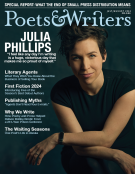When Shze-Hui Tjoa started writing her debut memoir, The Story Game (Tin House, May 2024), she was interested in exploring people and places that “looked aspirational but were actually problematic within.” Essays from the book, for example, dissect businesses peddling environmentally friendly practices and the colonial history behind Bali’s tourism industry. But as Tjoa wrote, she began to turn to herself: “I too was seemingly doing well on the outside but struggling with serious depression in private, with no memories from a large chunk of my childhood,” she says. “The writing became a way for me to track down these missing memories.” The resulting memoir, which alternates between imagined conversations Tjoa has with her younger sister and personal and critical essays, is an investigation into Tjoa’s past and the interplay between storytelling and memory.

Shze-Hui Tjoa, author of the debut memoir The Story Game. (Credit: Ivan Weiss)
Tjoa published her essay on tourism in Bali and the environmental degradation underpinning it in Quarterly Literary Review Singapore, or QLRS, an online quarterly established in 2001. Tjoa, who grew up in Singapore, praises the review for its resilience: “Because of pervasive government censorship in Singapore’s arts scene, creative outlets there have always had to fight for survival and for the freedom to showcase writers’ authentic voices.” QLRS accepts submissions from writers of all backgrounds but is focused on developing Singaporean literary arts. The editors publish poetry, stories, essays, criticism, and interviews. Submissions are open year-round via e-mail to editors@qlrs.com.
Tjoa placed her first piece in the United States with So to Speak, a journal of poetry, prose, and art edited by graduate students at George Mason University in Fairfax, Virginia. So to Speak, which releases one print issue as well as one online issue each year, takes an intersectional feminist approach. A recent issue featured “stories about exploring trans identity through dance to poems about finding your sexuality through fanfiction,” writes editor in chief Eli Vandegrift. Tjoa identified with the journal’s “generous, humanizing mission statement...and commitment to changing who we think of as a ‘canonical’ writer.” Her piece “On Being in Love With a White Man” won the journal’s annual nonfiction contest in 2020. The editors have since retired the contest in favor of using its cash prize to pay all contributors a modest honorarium. Submissions to So to Speak will open in August or September.
“I believe that I can fulfill my social role as an author most effectively when I write the whole, undiluted truth of what my eyes see,” says Tjoa. “A good editor gives me the bravery to push readers a little harder and prompt them to ask new or even challenging questions about the world.” She found that with Zach Linge, who published Tjoa’s “The True Wonders of the Holy Land” in Southeast Review when he was editor in chief there in 2021. The essay addresses Israel’s occupation of Palestine and its 2014 invasion of Gaza, a topic Tjoa found many did not speak about in the United States at the time. The biannual journal, which Tjoa calls a “fearless and truth-speaking publication,” is curated by graduate students at Florida State University. The review features poetry, fiction, nonfiction, criticism, and art online and in print. Submissions in all genres are open year-round via Submittable.
The Story Game chronicles Tjoa recovering her memories after years of living with complex post-traumatic stress disorder, culminating in “The Story of Body,” in which Tjoa depicts scenes from her childhood through two characters, Body and Mind. The essay first appeared in Colorado Review, which Tjoa describes as supporting formally innovative work. Tjoa notes that editor in chief Stephanie G’Schwind said in an interview that she “appreciates essays where two parallel lines of inquiry are happening in tandem: the concrete events that occurred and a more foundational question of why the author even wants, or needs, to write about these events at all.” Edited at Colorado State University in Fort Collins, the review publishes three print issues of poetry, fiction, and nonfiction every year. Nonfiction submissions are open year-round; fiction and poetry submissions open August 1. All submissions must be made via Submittable, and all contributors are paid.
Tjoa herself serves as an editor for literary magazines, a role that has connected her with a wider artistic community and given her more resilience when submitting her own work. “It has helped me to understand that rejections aren’t personal or even always the most reliable benchmark of quality,” she says. She is a former fiction editor at Exposition Review, an annual online journal of poetry, fiction, nonfiction, experimental narratives, writing for stage and screen, and more. Exposition Review is edited in Los Angeles and hosts readings, workshops, and a podcast, Transposition. Submissions for Exposition Review open on September 15 via Submittable; all contributors receive $50. The journal also runs a multi-genre flash contest four times a year, with the winning entries gathered in an annual flash issue. Submissions for the contest are currently open via Submittable with a $5 entry fee until July 5.
Dana Isokawa is the editor in chief of the Margins and a contributing editor of Poets & Writers Magazine.








